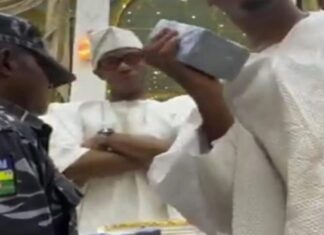Nigerian President Goodluck Jonathan says fighters from insurgent group Boko Haram have traveled to the Middle East for training with Islamic State militants.
Jonathan declined to name the countries where the fighters were allegedly trained. But in an interview with VOA Wednesday, he said he’s long suspected Boko Haram of having alliances with international extremist groups.
“So we know the links are there. But even now, we may not know the degree of linkages as to how much funds are coming in from them, the kind of volume of weapons coming in from them, the nationalities coming from them,” Jonathan said. “But the training, because some of the Boko Haram members go to have their training in the ISIS camp and come back.”
Nigeria has battled Boko Haram since 2009, primarily in the northeast. Thousands of people have been killed, injured and displaced in the fight. The group’s tactics have included suicide bombings and razing entire villages. Almost a year ago, its fighters raided a girl’s school in the town of Chibok and kidnapped more than 200 students who remain missing.
Jonathan is running for re-election on March 28 in what is expected to be the most competitive vote since Nigeria returned to democracy in 1999. Election officials postponed the vote from its original date in mid-February because the military said it couldn’t provide enough troops to guard the polls.
Since then, Nigerian soldiers along with troops from neighboring Chad, Cameroon and Niger have pushed Boko Haram out of many towns and villages they occupied in the country’s northeast.
In the interview, Jonathan credited both the intervention of Nigeria’s neighbors as well as the acquisition of new weapons for turning the tide against the militants.
He hit back at criticisms that foreign troops aren’t being allowed to push into Boko Haram strongholds deep in Nigerian territory. He said Cameroon previously denied Nigeria permission to pursue Boko Haram into its territory, and added that restrictions on foreign troops were matters of coordination.
“I think the idea is that — look, for any major aggression, we should know. Where possible, let some Nigerian soldiers also be with you,” the president said.
He also said that foreign technicians are present in the northeast to teach Nigerian troops on how to use their new weapons, since there wasn’t time to train the troops before they deployed.
“So we now have this technical people who are trainers and technicians, who are to train our people on how to use them, and technicians that help the maintenance, at the same time training our people how to maintain this equipment,” Jonathan said.
He said two unnamed companies were involved in the training but declined to offer nationalities or numbers of the trainers.
Jonathan dismissed the suggestion that Boko Haram’s insurgency has come to define his time in office.
“Yes, it’s a major security issue, it’s the number one security issue we have as a nation. But definitely you cannot define us by Boko Haram,” he said.
As the multinational offensive continues, Jonathan predicted that the northeastern states of Yobe and Adamawa would be cleared of Boko Haram territory before the middle of next week. He said he hopes neighboring Borno State, where the group started, will be cleared in the next three weeks.
But Jonathan said he expects Boko Haram to continue bombing markets and bus stops. He says the government’s strategy is to improve intelligence gathering as well as job and educational prospects in the northeast as a long-term strategy to destroy the group.
His main opponent, General Muhammadu Buhari, told VOA last week he is not surprised that Nigerian soldiers have started to push Boko Haram out of areas the militants had captured.
Buhari said that in the past the soldiers weren’t properly armed and weren’t properly motivated to fight. The joint operations with Chad, Niger and Cameroon forced the government to get more sophisticated weapons to the troops, Buhari said.
He also paid tribute to Nigerian soldiers, who, he said, have been known for gallantry in past international peacekeeping operations all over the world and promised them a better deal if he takes over the presidency.












